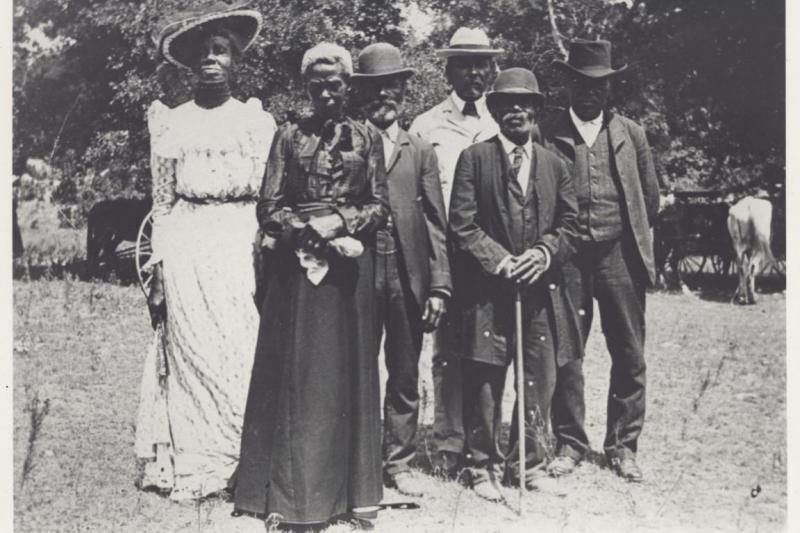
This Smithsonian photograph of an early Juneteenth celebration is just one small part of the many public offerings via their website, which is explained below. Or you can jump immediately to that Smithsonian Juneteenth website by clicking on this photo.
MONDAY, JUNE 19, 2023—That’s the date of this year’s official Juneteenth celebration but many communities nationwide are celebrating starting in early June. That nationwide expansion has been true since the day was first recognized as a federal holiday in 2021, when President Joe Biden signed the Juneteenth National Independence Day Act into law after the efforts of Opal Lee, Lula Briggs Galloway and others.
When our ReadTheSpirit magazine’s Holidays & Festivals column began in the summer of 2007, we often had to explain the meaning of this observance and to point out that most observances were in Texas. Our readers often had to search locally for Juneteenth observances across the rest of the U.S.—and often could not find events close to home.
Not so anymore!
Now, street fairs, ceremonies, gospel concerts, exhibitions and prayer services take place across the nation in celebration of the oldest known commemoration of the ending of slavery in the United States: Juneteenth, also known as Emancipation Day.
Juneteenth doesn’t mark the January 1, 1863, Emancipation Proclamation itself; instead, this holiday recalls the date, more than two years later, when slaves in Texas were finally freed and former Confederates were forced to recognize the Proclamation.
CELEBRATIONS, FESTIVALS and EXHIBITIONS NATIONWIDE
In 2023, if you do a local search for Juneteenth events, you’re likely to find organizers starting quite early! One example is the city of Boulder, Colorado, where related events are scheduled well before June 19.
That’s just one local example, but you’re likely to find “early” events wherever you live across the U.S.
Nationally, the Smithsonian set this ambitious goal of widening awareness of the observance:
To celebrate the day when more than 200,000 enslaved African Americans in Confederate states were declared free June 19, 1865, the Smithsonian’s National Museum of African American History and Culture (NMAAHC) will host a variety of events and programs highlighting Juneteenth all month long. Also known as Freedom Day, the Juneteenth holiday represents a time to gather with family and community, honor the present and reflect on shared history and tradition. This year’s theme is Senses of Freedom: Exploring the Tastes, Sounds and Experiences of an African American Celebration. Detailed information about the holiday and the museum’s programming and educational resources can be found on its award-winning Juneteenth webpage.
EMANCIPATION AND THE ROAD TO FREEDOM
Though slaves had been freed more than two years earlier, under President Lincoln’s Emancipation Proclamation, slaves in the deep South had felt minimum impact.With the surrender of General Lee in April 1865, Northern forces became strong enough to overcome resistance in the South.
On June 18, 1865, Union General Gordon Granger and 2,000 federal troops reached Galveston, Texas, to enforce emancipation. And on June 19, Granger read aloud the contents of “General Order No.3.” The Order read, in part:
“The people of Texas are informed that in accordance with the Proclamation from the Executive of the United States, all slaves are free. This involves an absolute equality of rights and property between former masters and slaves, and the connection heretofore existing between them becomes that between employer and free laborer.”
In reaction to the news, men and women who had been enslaved danced in the streets. Some immediately left their former masters in search of freedom or to find family members. The next year, freedmen organized the first annual “Juneteenth” celebrations in Texas, using public parks, church grounds and newly purchased land for the jubilant parties.
ADDITIONAL RESOURCES
Looking for more?
Learn the history of Juneteenth from the Library of Congress and PBS.
Find recipes fit for the day at the Food Network, or at Parade—or Betty Crocker.
from Religious Holidays https://ift.tt/4lu65F9

 :: Unlock Your Success with Our Digital Course →
:: Unlock Your Success with Our Digital Course →













No comments:
Post a Comment